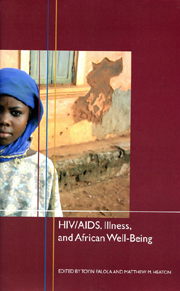Book contents
- Frontmatter
- Contents
- Acknowledgments
- Part I Context
- Overview to HIV/AIDS, Illness, and African Well-Being
- Introduction: The Evolution of Disease in Africa
- 1 The Infectious Continent: Africa, Disease, and the Western Imagination
- Part II Illness Case Studies
- Part III Globalization, Development, and Health
- Part IV HIV/AIDS
- List of Contributors
- Index
- Rochester Studies in African History and the Diaspora
1 - The Infectious Continent: Africa, Disease, and the Western Imagination
from Part I - Context
Published online by Cambridge University Press: 05 February 2013
- Frontmatter
- Contents
- Acknowledgments
- Part I Context
- Overview to HIV/AIDS, Illness, and African Well-Being
- Introduction: The Evolution of Disease in Africa
- 1 The Infectious Continent: Africa, Disease, and the Western Imagination
- Part II Illness Case Studies
- Part III Globalization, Development, and Health
- Part IV HIV/AIDS
- List of Contributors
- Index
- Rochester Studies in African History and the Diaspora
Summary
While Western depiction of Africans as virulent and dangerous is certainly not new, the recent acceleration of economic and cultural exchange has apparently raised the stakes. HIV emerged as a pathogen simultaneously with new anxieties over the risks of other “contagions.” And while it may seem clear that one pandemic is painfully literal, the other figurative, they were quickly associated with one another. In fact, economic exploitation, cultural exchange, and disease are interrelated—but Africanness is hardly the deadly pathogen.
Barbara Browning, Infectious RhythmIn the essay “Sexual Cultures, HIV Transmission, and AIDS Prevention,” Richard Parker writes that “in little more than a decade the rapid spread of the international AIDS pandemic has profoundly changed the ways in which we live and understand the world.” Although I do not wish to question the veracity of Parker's claim, I believe an inversion of terms can also provide interesting insight: the way in which we live and understand the world has profoundly affected the AIDS pandemic and its surrounding discourses. In addition to being an important medical and scientific issue in and of itself, HIV/AIDS has come to constitute a “focal point for many of the social ills that plague modern society,” ills that in many cases long predate the appearance of this particularly malignant virus.
- Type
- Chapter
- Information
- HIV/AIDS, Illness, and African Well-Being , pp. 28 - 42Publisher: Boydell & BrewerPrint publication year: 2007



